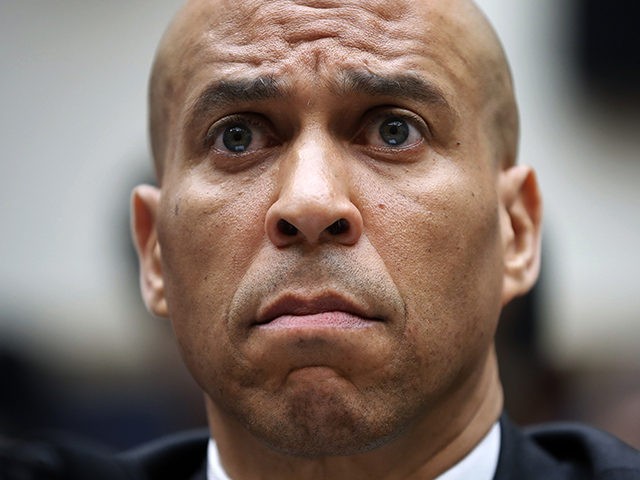Testifying Wednesday before a House subcommittee on reparations for slavery, 2020 White Houe hopeful Sen. Cory Booker (D-NJ) said that the United States has thus far failed to adequately address the “white supremacy that tainted this country’s founding.”
The House Judiciary Subcommittee on Constitution, Civil Rights and Civil Liberties is holding a hearing on subcommittee member Rep. Sheila Jackson Lee’s (D-TX) H.R. 40 bill to establish a commission to study reparations. The panel invited Booker, Hollywood actor and left-wing activist Danny Glover, author Ta-Nehisi Coates, and others to discuss Lee’s measure that was re-introduced in January. In April, the New Jersey Democrat introduced his own version to the Senate.
Booker, who testified first, said the U.S has “yet to truly acknowledge and grapple with the racism and white supremacy that tainted this country’s founding and continues to cause persistent and deep racial disparities and inequality.”
“The stain of slavery was not just inked in bloodshed, but in policies that have disadvantaged African Americans for generations,” he added.
Following Booker was Glover, who declared that establishing a national policy on reparations for descendants of enslaved Africans is a “moral, democratic, and economic imperative.”
“A national reparations policy is a moral, democratic, and economic imperative,” he told lawmakers, before detailing his lineage as a descendant of former slaves. “I sit here as a great-grandson of a former slave, Mary Brown, who was freed by the Emancipation Proclamation of January 1st, 1863. I had the fortune of meeting her as a small child.”
“Despite much progress over the last centuries, this hearing is yet another important step in the long and heroic struggle of African-Americans to cure the damages inflicted by enslavement, post-emancipation and forced racial exclusionary policies,” he added.
The hearing comes amid a growing discussion in the Democrat Party about reparations. Several of the party’s presidential candidates have endorsed looking at the idea, though they have stopped short of endorsing direct payouts for African Americans.
In a Point Taken-Marist poll conducted in 2016, 68 percent of Americans said the country should not pay cash reparations to African American descendants of slaves to make up for the harm caused by slavery and racial discrimination. About 8 in 10 white Americans said they were opposed to reparations, while about 6 in 10 black Americans said they were in favor.
Senate Majority Leader Mitch McConnell (R-KY) said Tuesday that he opposes reparations, telling reporters: “I don’t want reparations for something that happened 150 years ago. We’ve tried to deal with the original sin of slavery by passing civil rights legislation.”
“It would be hard to figure out who to compensate” for slavery, the Kentucky Republican noted. “No one currently alive was responsible for that.”
Appearing Wednesday on Sirius XM radio, Booker criticized McConnell’s remarks, accusing the Kentucky Republican of demonstrating a “tremendous amount of ignorance.”
Booker argued reparations is about “equality of opportunity, a leveling of our economic playing fields, health playing fields, housing playing fields” and “addressing those past consciously racial harms and wounds.”
The Associated Press contributed to this report.

COMMENTS
Please let us know if you're having issues with commenting.